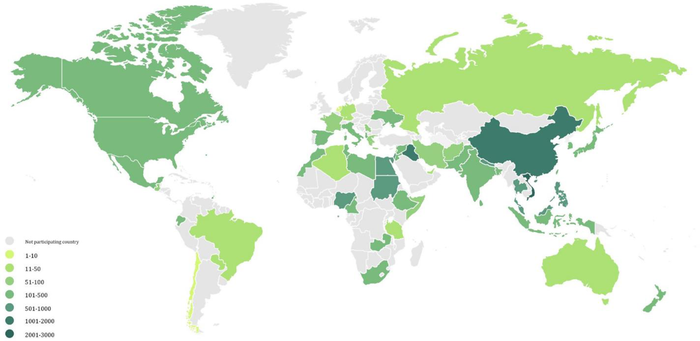World map showing the distribution of study countries and study participants. Shade of green represents the number of participants per country. Courtesy of Huy et al., 2021, PLOS ONE
A survey of healthcare workers in 57 countries found that while overall preparedness for and awareness of the COVID-19 pandemic were at levels deemed acceptable during the first wave, significant differences in these levels were seen across worker groups and countries. Nguyen Tien Huy of Nagasaki University, Japan, and international colleagues present these findings in the open-access journal PLOS ONE on Dec. 22, 2021.
Among healthcare workers, awareness and preparedness regarding COVID-19 play a central role in reducing risk of transmission at hospitals and keeping workers safe. A clear understanding of worker awareness and preparedness is needed in order to inform healthcare policies for both the ongoing pandemic and potential future outbreaks of other diseases.
To provide new insights, Huy and colleagues conducted a survey of healthcare workers from 371 hospitals in 57 different countries, receiving a total of 17,302 responses between February and May of 2020—during the first wave of the COVID-19 pandemic. The survey included questions to evaluate COVID-19 awareness and preparedness; these questions were adapted from widely adopted COVID-19 preparedness checklists developed early on in the pandemic.
Statistical analysis of the survey responses found that the median COVID-19 preparedness score was 11 out of a maximum score of 15, and the median COVID-19 awareness score was 29.6 out 40. The researchers consider these levels to be acceptable. However, both scores were significantly higher among workers with previous outbreak experience or who received training for the COVID-19 outbreak. Preparedness scores were also higher for male participants and nurses than for women and doctors.
In addition, preparedness varied according to national wealth and sociodemographic characteristics. For instance, countries in East Asia and the Pacific had significantly higher preparedness scores than countries in sub-Saharan Africa, the Middle East, and Latin America.
These findings suggest the need for training opportunities that are more equitable across genders, the researchers say. They also call for better knowledge sharing between countries to learn from prior outbreaks. Future research could examine how awareness and preparedness among healthcare workers has evolved over the course of the pandemic.
The authors add: “Our global survey of more than 17,000 healthcare workers in 57 countries during the first wave of the coronavirus found that rapid COVID-19 training courses increased awareness and preparedness levels of medical staff. Female healthcare workers, however, had lower preparedness/awareness scores than their male counterparts, which may have translated into higher burden of SARS-CoV-2 infection. Training opportunities need to be gender-equitable to safeguard the workforce and stem transmission within healthcare facilities.”
Source: PLoS ONE
